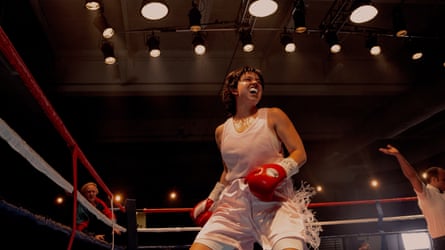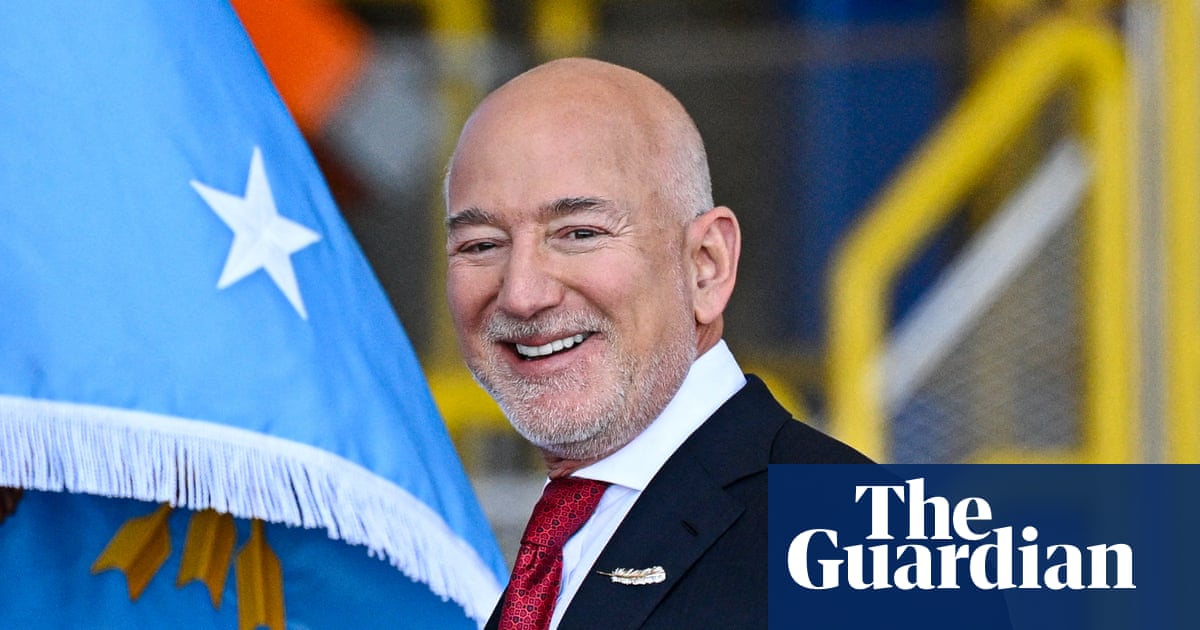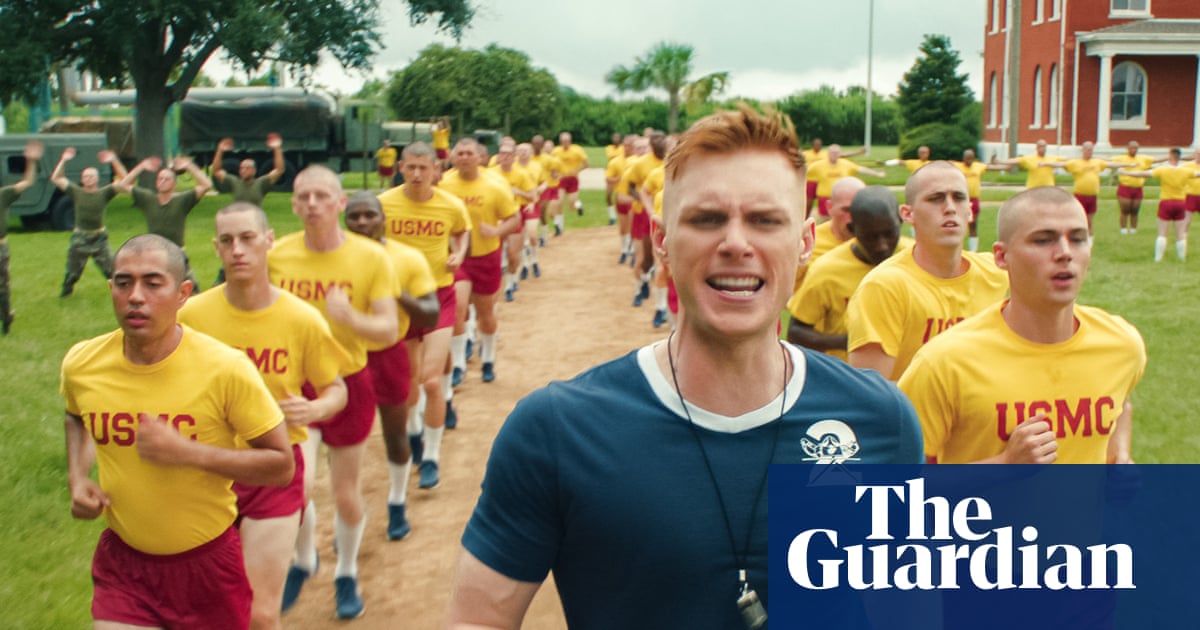There was much blood and sweat – but few tears – involved in Sydney Sweeney’s transformation into Christy Martin. David Michôd’s biopic of the trailblazing fighter, who hauled women’s boxing into the US mainstream in the mid-1990s, spends much of its runtime recreating Martin’s real-life fights. And she doesn’t always win. I left the screening wondering if I had genuinely just seen Sweeney – whose acclaimed acting career, canny commercial ventures and unwitting contributions to the online outrage cycle have combined to make her one of the world’s most famous women – being mercilessly and repeatedly punched in the head. Turns out I had.
“Oh yeah, they were all real. Every fight that you see, we’re hitting each other,” says the 28-year-old cheerily. “I had concussions, there were some bloody noses.” Were the concussions frightening? “Nah, I loved it! The lady who played Laila Ali” – Muhammad Ali’s daughter, who defeated Martin by knockout in 2003 – “is an actual professional boxer. She’s in the air force and fights for Team USA – she hit hard and it was very, very real. She’s how I got my concussion.” Sweeney felt she truly “became a fighter. It was such an exhilarating feeling. In between takes, I’d be like: ‘I think I won that round!’”

In the ring, Sweeney was essentially cut loose from the rest of the production (Michôd says the fighting was “a thing that I had very little to do with; it became a negotiation between Sydney and the stunt performers”). But when it came to bulking up – she gained two-and-a-half stone to match Martin’s fighting weight of “135 to 137lbs” – she had a buddy. On set, Sweeney kindly shared her calorific snack of choice, Uncrustables (this quintessentially American product, which Sweeney ate “endlessly”, is essentially a small frozen jam sandwich with the crusts cut off), with her co-star Ben Foster. He also consumed “a lot of burritos” in order better to resemble Martin’s boxing promoter husband Jim. It worked. “I think it was the second week when Syd came up and just started touching my double chin,” recalls Foster. “She was like: ‘That prosthetic looks really good.’ And I said: ‘That’s not a prosthetic.’ I was like: ‘Yes!’” Foster mimes triumph as Sweeney chuckles at the memory.
Foster and Sweeney are sitting side by side in a hotel room overlooking the Thames; they are in town for Christy’s UK premiere at the London film festival (Sweeney has no problem watching herself on screen, Foster finds it rather painful: “Sometimes it cuts a little too deep – I love Syd’s approach”). Down the corridor are two thoughtful, softly spoken Australians: Michôd – best known for dystopian thriller The Rover and Brad Pitt Afghanistan drama War Machine – and his co-writer (and partner of 20 years) Mirrah Foulkes.
Sweeney’s physical transformation and sporting prowess might be the most headline-grabbing element of Christy, but at its heart the film is a subtle and serious document of an abusive relationship: Jim is a master manipulator who takes full advantage of his position as his wife’s manager. For Michôd, the biggest draw was “the opportunity the movie presented to explore how these coercive control relationships function. I was that kind of run-of-the-mill numpty who couldn’t understand why she didn’t leave him.”
The seeds of the film were sown by Michôd’s business partner, who informed him one day that Martin’s life rights were available. His first question was: “Who’s Christy Martin?” Once the director had familiarised himself with her shocking story – largely via Laura Brownson’s haunting Netflix documentary Untold: Deal With the Devil – he met Martin and realised what a compelling, complex character she was. “How this pugnacious, brawling, trash-talking, supreme athlete was actually incredibly gentle and vulnerable and wears her emotional scars so openly.”
The real Martin – who now goes by her maiden name Salters – ended up being closely involved with the film, but she was initially unconvinced. Having experienced “a world of gangsters and rip-off artists [in boxing], I think she had the same suspicions of Hollywood,” says Michôd. Gradually, he and Foulkes won her trust. Then they set about looking for a star.
Options were limited. “Obviously there are the commercial realities of needing someone of serious social stature,” says Michôd (Sweeney has 25m Instagram followers and is a tabloid fixture). “Needing someone of the right age, a particular physicality, and a hunger for it.” How did he know Sweeney had the right mindset? “You can just tell. I was on a Zoom with her and I could tell that she wanted this really, really bad. You can just feel that energy in a person.” He had the same hunch when casting Timothée Chalamet in his 2019 historical epic The King.

When Sweeney first received the script, she didn’t know who Christy was either (“I was actually kind of disappointed in myself. She’s one of the most inspiring and remarkable women I’ve ever met”). Yet she soon realised that “on a lot of different levels I understood and could relate to Christy. She has her fight inside the ring and outside the ring and I fight within my own ring and outside my ring. Misunderstood. Complicated relationships. Growing up as a woman. Carving out our own paths and figuring out who we are.”
To play Christy, Sweeney succeeds in pulling off a very delicate balancing act. Initially, this small-town girl from West Virginia is tough but entirely sympathetic: a mullet-sporting basketball enthusiast who refuses to be shamed for being gay. In the years that follow, she discovers a talent for boxing, meets and marries Jim – despite clearly finding him unappealing – and slogs her way to the top of her game. Finally, she’s signed to big-name promoter Don King and becomes a bona fide celebrity, working the chatshow circuit, appearing on the cover of Sports Illustrated (headline: The Lady Is a Champ) and almost single-handedly introducing female boxing to the masses. We never stop rooting for her – yet her public persona is a strange, unpleasant beast. Now back in the closet, she makes jibes about other boxers being “dykes” and mocks them as they stagger round the ring in defeat. Meanwhile, she appears on TV claiming to be a traditional homemaker who staunchly refuses to give any support to other women in the sport.
Sweeney has had her fair share of negative press, particularly the recent furore about her American Eagle jeans advert, whose tagline was interpreted by some as a nod to white supremacy. In 2022, she faced similar outrage when pictures emerged of guests sporting Maga-style caps at her mother’s 60th birthday party. How does she feel about that? “I think what’s interesting is I’m always myself. I’m always just me. But it’s what other people put on me that’s uncontrollable. Like you’re going to write this article … Then people will read it and have their own perception. So I try and be as much of me as possible, but it’s always through other people’s lenses.”
Christy, however, is not being herself. Foulkes puts her aggressively regressive persona down to “this combination of very bad influences [in the boxing world] and also a great degree of self-loathing combined to create someone that was really kind of cruel”. Sweeney sees Martin’s apparent rejection of feminism and embrace of traditional values slightly differently. “I don’t think that she’s anti-feminist, she just wasn’t there to be a puppet for a movement. She was there to go after something that she loved. And what she becomes for other people – the role model she becomes – that’s not her end goal.” As for her isolationist approach, “in boxing, it’s a singular sport, it’s not a team sport. So it’s not like a big community of fighters fight together,” she says, with the absolute decisiveness that accompanies the entirety of her conversation.

Sweeney hasn’t boxed since she finished work on Christy. Seven weeks after wrap, she began filming her next project – the long-awaited third season of HBO’s Euphoria, in which she plays Cassie (one of two Emmy-nominated watercooler TV turns that springboarded her to household name status; the second was privileged student Olivia in the inaugural season of The White Lotus) – “so I had to stop everything and drop all the weight”. As Christy, Sweeney felt “the strongest, full-of-life version of myself”. Was it hard to get back into her previous shape? “It was definitely a mental challenge and almost a physical withdrawal from being able to work out so much, which was kind of like a weird serotonin drop.”
As a film, Christy is also an exercise in strange mood swings, lurching from a misty-eyed, feelgood sports biopic to something closer to a horror movie, as Jim’s mistreatment of Christy escalates into almost unbelievable depravity. How did Foster – who is spectacularly chilling in the role – manage to connect with Jim, a man with few redeeming qualities?
Jim’s obsession with controlling Christy “is on paper a difficult thing to find a lot of compassion for,” says the actor. “So I guess in trying to find a brief way to say this: there are a lot of bullies in the world right now. And the way that they control one person or a society – or attempt to – [proves] they’re very fragile, and they’re very insecure.” Jim’s “increasing acts of control,” thinks Foster, were a way to “protect himself”. For Michôd, the key to Jim was identifying “this deeply embedded trauma in so many of these men”. Foulkes found it “important to find some way to humanise Jim without justifying horrific actions and that’s why I think Ben’s performance is very beautifully nuanced because he does manage some moments of humanity for Jim and charm even and brokenness”.
At the end of a day on set, Foster found it extremely difficult to psychologically shake off Jim’s abuse. The material didn’t weigh so heavily on Sweeney. “I am capable of turning it on and off very easily,” she says of her ability not to dwell on the disturbing subject matter once the cameras stop rolling. Which isn’t to say she didn’t have an emotional connection to the material. When I mention the Oscar buzz generated by the festival circuit, she immediately deflects. “I mean, I’m incredibly honoured that people are talking that way. But I’ve always said that I did this for Christy. For me, all that mattered was that she was happy with the film and that people get to see her story.”

 2 months ago
81
2 months ago
81

















































